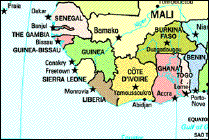 Back
to the Related Cases
Back
to the Related CasesLiberia
After 100 years of one-party rule; ten years of brutal military and civilian rule
(1980-1990) a savage civil war erupted in Liberia and lasted for seven years which
ultimately ended in a very delicate peace settlement.
This civil war started with the invasion of the National Patriotic Front of Liberia
(NPFL). This insurgent organization invaded Liberia from the Ivory Coast, with the
assistance of regular soldiers from Burkina Faso, and mass recruits from the Mano
and Gio ethnic groups.
Reasons for the invasion: Samuael Doe, the inaugurated President of Liberia was thought
to have rigged the general elections held in 1985 to restore civilian rule over Liberia.
After the election a Thomas Quiwonkpa attempted a military coup, from the Gio nation.
This attempted coup failed and brought down the wrath of the Doe administration,
which began a massive campaign of retribution against the coup plotters and their
supporters, General Doe and his army, went on a national killing spree, especially
against innocent civilians who were associated with Quiwonkpa's Gio nation, and the
ethnically related Mano people.
NPFL forces obtained their training from Libya, and received their financial support
from Libya, Burkina Faso, Ivory Coast, and from Liberian opposition groups abroad.
The Mano and Gios (both groups comprise about 15 percent of the Liberian population
and are linguistically related) were motivated to join the rebellion against the
Doe regime because both suffered disproportionately during a 1985 military coup.
Burkina Faso and Ivory Coast had a personal grudge against President Doe because
his regime murdered AB. Tolbert and his father, President Tolbert. A. B. Tolbert
was the son-in-law of President Felix Houphouet-Boigny.
The ensuing civil war become so onerous, that a group of West African states under
the aegis of the Economic Community of West African States (ECOWAS) decided to intervene
militarily to save the nation from descending further into anarchy. They formed ECOMOG,
ECOWAS Monitoring Group.
Eventually three major forces emerged from the Civil War to war with each other.
The NPFL, the Independent National Patriotic Front of Liberia (INPFL), and Armed
Forces of Liberia (AFL). These forces carved up Liberia in military skirmishes and
established their own governments. Attempts at reconciliation and unity were made
and failed. Enter the "United Liberation Movement of Liberia for Democracy (ULIMO)
another rebel group. This group is said to be responsible for the torture and killing
of hundreds of civilians. The resulting years saw no less than 10-rebel group's form
and via for control. ECOMOG continued to play a role in trying to police, monitor
and negotiate settlements.
In September 1993, the Security Council of the United Nations passed "Resolution
866" which created "United Nations Observer Mission In Liberia," UNOMIL.
The UN mission had a force of 651 persons, including 303 Military
Observers, 20 military medical personnel, 45 military Engineers, 58 UN volunteers,
89 international civilians, and 136 local civilians staff.
Adding even more complexity to the situation is the traditional ethnic rivalry among
the Mandingos, the Lormas and other ethnic groups. There is evidence that the Mandingos
instigated the crisis during the civil war, when they indiscriminately burned the
scared shrines of the Lormas and other groups, as a way of converting those groups
to Islam. This rivalry dates back to the 19th century.
The U.S. contributed to the UN Peacekeeping force and acted primarily through
the UN operation and through cooperation with ECOMOG. The US has played a primarily
humanitarian role in this situation. The uneasy peace that has existed in Liberia
since national elections were held voting Charles Taylor president is attributed
mainly to the UN Observer mission and ECOMOG.
The US policies on Africa focus on stability through economic development and assistance.
Clinton's entourage in Clinton's Africa trip discussed the US shift in policy from
a paternalistic relationship towards a partnership in 1998. During this trip Clinton
announced his Education initiative for Africa which will invest 120 million in forming
partnerships for educational programs with African organizations.